Charley Rosen 1941-2025: Basketball Gypsy with a Genuine Soul
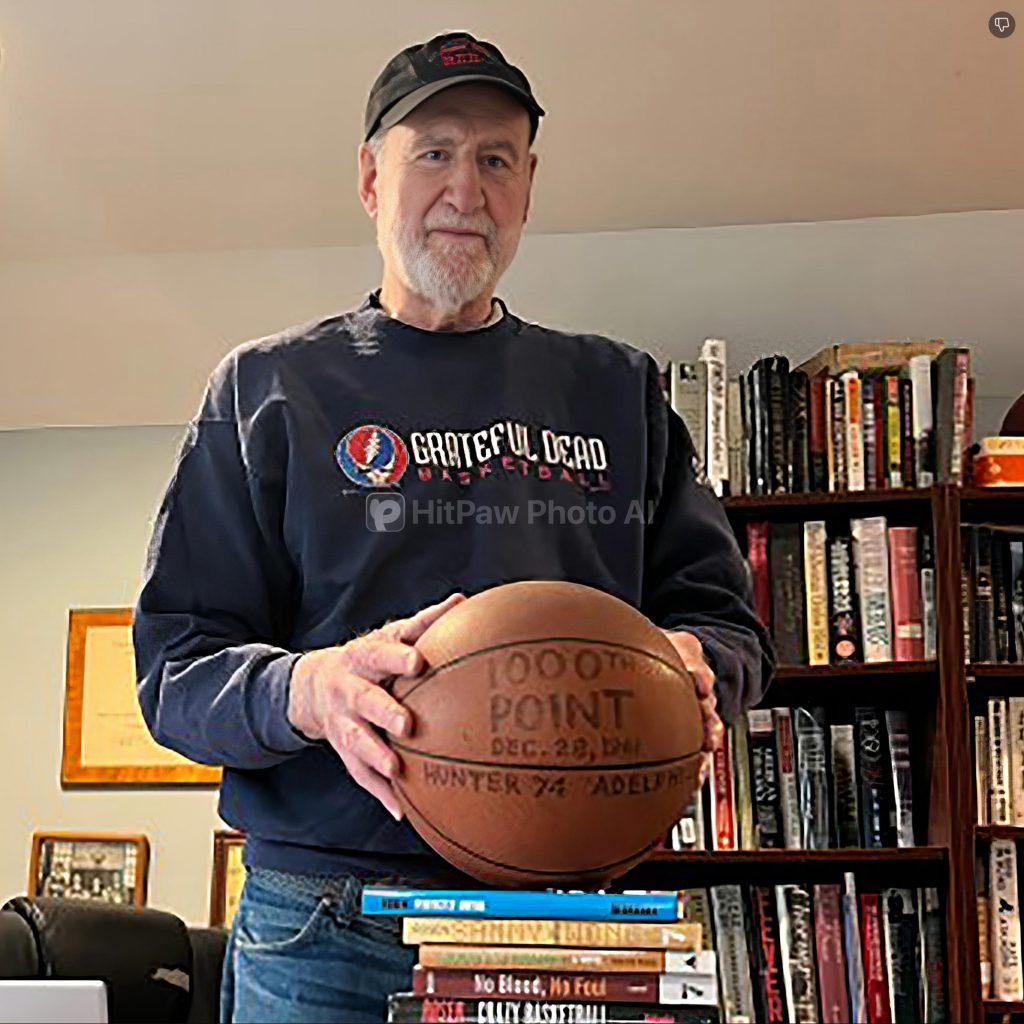
Charley Rosen, Touch of Grey
In a strange way, sitting down and talking to basketball coach-writer-music fan Charley Rosen led to my experimental experience of covering the 1990-91 Bulls for the Chicago Sun-Times.
I’ve always been appreciative of the shadows in minor league sports. Real life lives there. When the Rockford Lighting debuted in the 1986-87 season of the Continental Basketball Association (CBA) I was at the MetroCentre in downtown Rockford.
The late Bulls great Norm Van Lier was the team’s head coach. Future Chicago radio guy Dan Bernstein was working the market. Chicago prep star Cazzie Russell was coaching the Wyoming Wildcatters and Rosen’s good friend and future Bulls coach Phil Jackson was at the helm of the Albany Patroons.
Rosen took over the Lightning for the 1987-88 season. He marched to the beat of a different drummer, and that would be Mickey Hart.
Rosen died Sept. 13 of thyroid cancer in a Kingston, NY hospital near his home. He was 84 years old.
Rosen was a unique character and true to himself. Referees drove him crazy on the sideline but off the court he had a healer’s soul. The Sun-Times gave me the opportunity to write a couple of profiles on him, which led to a profile on a then-unknown Phil Jackson, which led to me being assigned the Bulls beat. I had been a free spirit music and nightlife writer. Meshing that with the NBA, what could go wrong?
Looking back, I suppose I was as different as Rosen. I wrote a lot about the atmosphere and touch of the game as opposed to Xs and O’s. I also wasn’t the best on filing deadline stories from the Chicago Stadium press box on a Radio Shack TRS-80. I did talk to Bill Cartwright about Marvin Gaye and gave Horace Grant some Sam Cooke music tips. I was indebted to my editors for taking a chance on me. There’s so many ways to hear music.
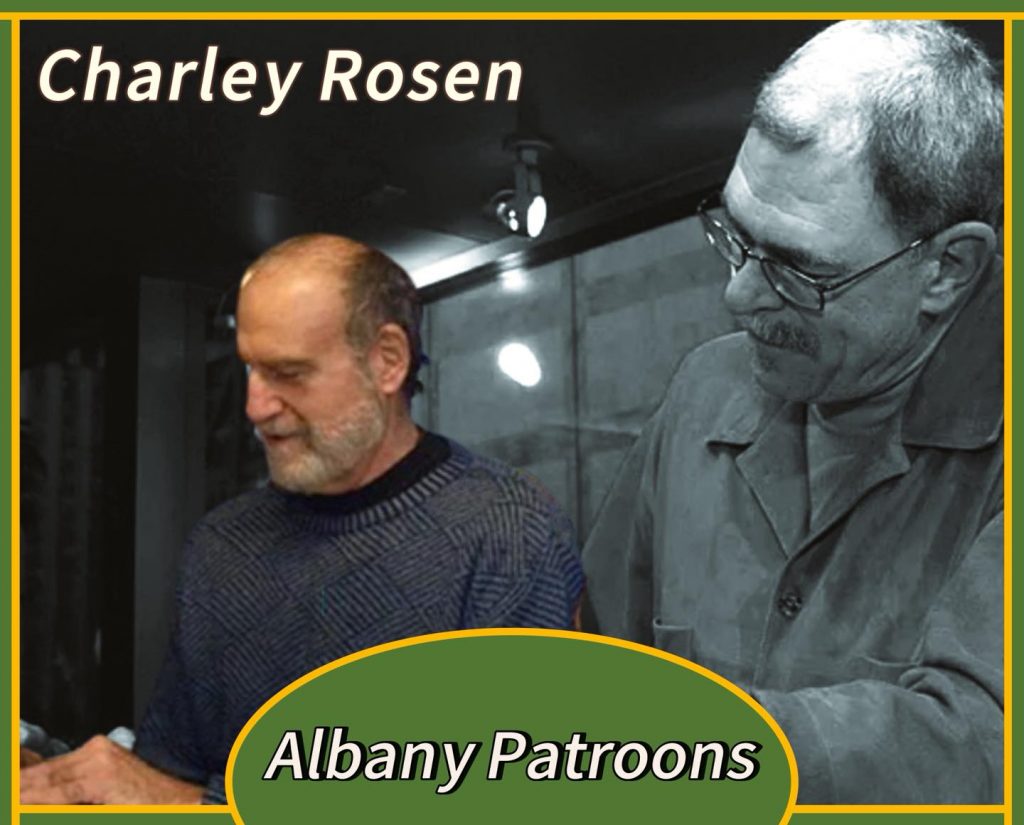
Charley and Phil Jackson, via the Albany Patroons.
Rosen had a huge collection of Grateful Dead concert bootlegs and wrote about his library for Rolling Stone magazine. He was a contributing writer for Crawdaddy magazine. I once made a cassette mix of the African-American string band Martin, Bogan and Armstrong for Rosen and Jackson. They appreciated it.
Rosen lasted three years as coach of the Lightning before heading off to coach the CBA’s Oklahoma City Cavalry in 1990-91. He carried a lot of empathy, a key ingredient in coaching minor league basketball. Always ahead of his time, between 1993-95 Rosen was coach of the women’s basketball team at SUNY (State University of New York) New Paltz.
Rosen lived near the site of the original Woodstock music festival. I talked to him in 1994 after he had finished the novel “By the Time I Got to Woodstock.” He was shopping it to a couple of publishers, and although he published more than 30 books in his lifetime, I don’t know if this one was released.
Earlier in 1994, Rosen told the Wall Street Journal that he was slated to be one of Jackson’s assistants on the Bulls and added, “I guess I didn’t fit into the Bulls corporate image.
“I’m the spirit of Woodstock past.”
Rosen told me that he and his wife missed the first Woodstock because they were vacationing in California and staying with NBA free spirits Stan Love (younger brother of Beach Boy Mike Love) and Steve Patterson.
The Rosen library includes 1976’s honest “Maverick” (Playboy Press), and 2001’s “More Than a Game,” both written with Jackson, “The Cockroach Basketball League,” “Sammy Wong All-American” and the novel “Dribbling a Basketball on the Road to Damascus.” I last spoke to Rosen in 2015 when he was a guest on my WGN-AM radio show to promote his book “Perfectly Awful: The Philadelphia 76ers Horrendous and Hilarious 1972-73 Season. The e-mail with his home phone number contained just one line: “what a long strange trip it’s been.”
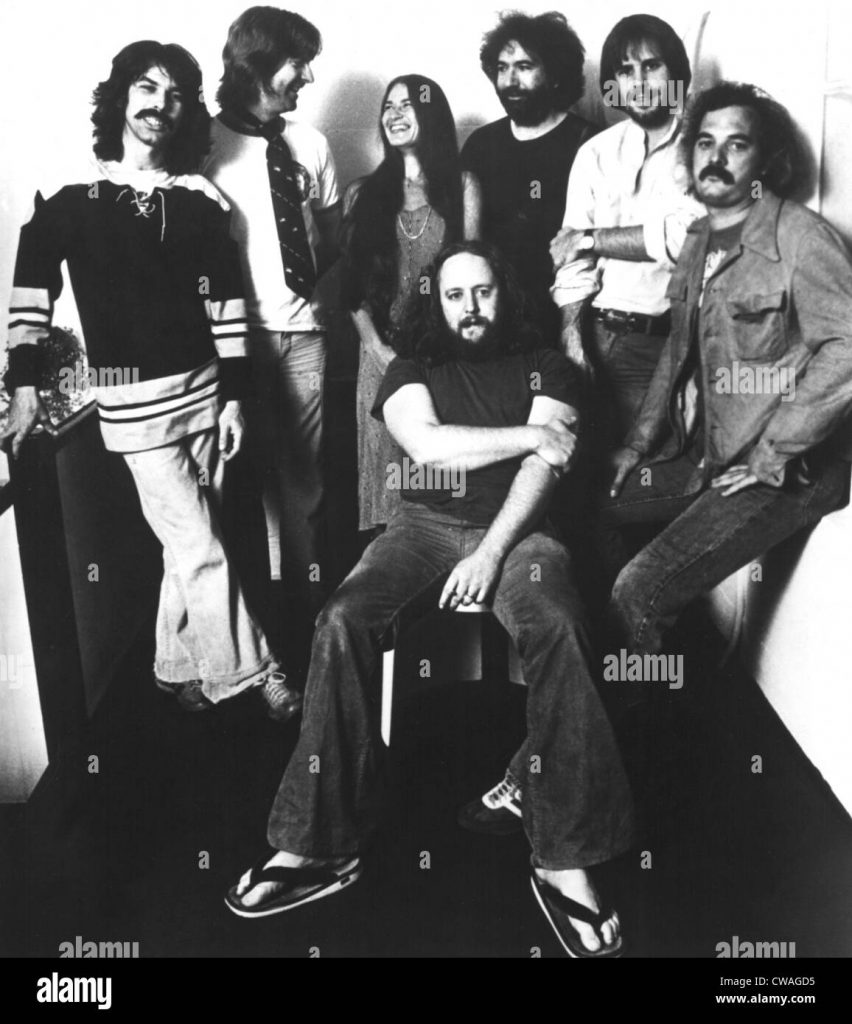
Not the 1989-90 Rockford Lightning.
And with that, here is an edited version of my 1989 profile on Rosen. My then-(and good natured ) wife Wendy and I drove to Rockford for the New Years’s Eve CBA All-Star game. We stayed at the Alpine Inn (where the Lightning team lives!) How romantic. I spoke to Rosen after the game. He told me the future doesn’t exist.
Charley Rosen won’t be forgotten. True souls never are.
Feb. 24, 1989—
ROCKFORD, Ill.— The coaching history of the Rockford Lightning franchise in the Continental Basketball Association is a spirited bolt from Stormin’ Norman to Gentle Zen. When fiery former Chicago Bull Norm Van Lier was vaporized after 12 games as Lightning head coach in December of 1986, their inaugural season was completed with CBA veteran Mauro Panaggio. The Lightning started the 1987-88 campaign behind Charley Rosen, a cerebral coach with an iconoclastic approach.
“Basketball is a very spiritual game,” Rosen explained in a recent conversation after the CBA All-Star game here. “It’s a chance for a group of people to transcend themselves – transcend their own egos and even sometimes transcend the competition. Sometimes you play a game and you don’t know who’s winning or who’s losing. It’s like a fulfillment. Everybody knows their role and everybody sublimates their ego to everybody else.”
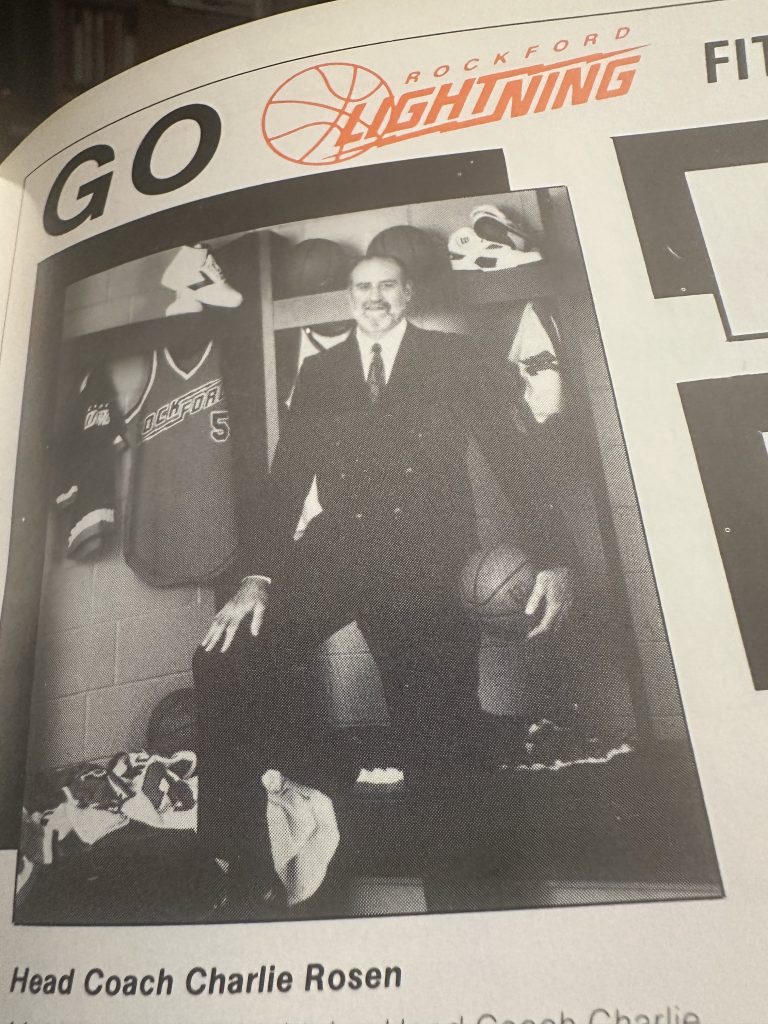
From the author’s collection of old Rockford Lightning programs.
Rosen has a Master’s degree in Medieval Studies from Hofstra University, where his thesis was “Allegory in the Canon’s Yeoman’s Prologue and Tale.”
And that’s not some medieval Darryl Dawkins dunk.
Rosen is also a successful author. His 1975 book, Have Jump Shot Will Travel was nominated for a National Book Award, and he has profiled Billy Cunningham, Elvin Hayes and Ralph Sampson for Sport magazine. For the last nine years, Rosen has been a contributing writer at Inside Sports magazine.
Whether writing or coaching, Rosen subscribes to a Zen philosophy. In a league where tomorrows are precious trinkets, he lives for today. “I don’t think about aspirations,” he said. “I try to take a Zen attitude that what I’m doing at the present moment is where I want to focus my whole energy. . . .
“The future doesn’t exist. All you do is extend your ego into the future and make Christmas list. That leads to frustration, a division in everything – `This is good because it promotes what I want; this is bad because it doesn’t’ – and then you wind up in a lot of trouble.”
Rosen has constructed a team in his image. The Lightning play an intense somewhat conservative style of basketball that subscribes to unity and soul. The Lightning is a mix of the springtime promise of former Villanova forward Dwayne McClain, the seasoned shadow of guard Kenny Natt, who has spent eight years in the CBA, and the melodic hustle of 5-9 guard Brent “Hoagy” Carmichael.
They mesh.
“These guys are really hand-picked,” Rosen said. “We just get along and that’s important in this league.”
Rosen last summer tracked down McClain, a 1985 second-round draft choice of the Indiana Pacers who had been living at home. Rosen signed McClain a couple of weeks before Christmas, and on New Year’s Eve McClain had 18 points in leading Rockford to a 108-97 victory over the CBA All-Stars. He was named the game’s MVP..”
The constant roster transition in the CBA makes it difficult for a team’s coaches and players. On top of that is the players’ impatience often developed from a one-dimensional offensive perspective.
“Most players think they’re going to shoot their way back into the NBA,” Rosen said. “You gotta convince guys to play roles and to give the ball up. You gotta convince guys that posting up a 6-3 guy and scoring 40 CBA points – that’s not going to do them any good as far as the NBA is concerned. So creating a team concept is difficult in the CBA.”
Rosen broke into professional coaching in 1983 as an assistant under current Bulls assistant Phil Jackson when he was coaching at Albany. Rosen had co-written the basketball book “Maverick” with Jackson in 1976. Rosen, who majored in physical education at Hunter College in the Bronx, was working at a health club and writing for Sport Magazine when Jackson hired him. They worked out a deal where Rosen got paid game by game.
“I felt he communicated extremely well with ballplayers,” Jackson said. “He’s a very good talker to big guys and he knows the post game well. Charley keeps everything in perspective. He’s loose enough and yet he’s intense about the game.”
Rosen stayed with Albany until the 1986-87 season, when he was named head coach of the CBA’s Savannah Spirits. The next year, he moved to Rockford finishing second in the Western Division with a 37-17 record. On the climb up the CBA ladder, Rosen kept writing books. He began dabbling in fiction in the mid-1960s while teaching English in Middletown, N.Y. Rosen wrote four novels, all of which wound up in an incinerator.
When Rosen and his family moved to New York City in 1973, his neighbor was the managing editor of Sport magazine. Rosen began contributing articles to the magazine.
“Have Jump Shot Will Travel” is Rosen’s best-known work. Loosely autobiographical about playing minor league hoops, the book follows the trail of Bo Lassner, a 6-8, 225-pound white backup center on the Wellington Rifles of the Atlantic Professional Basketball Association.
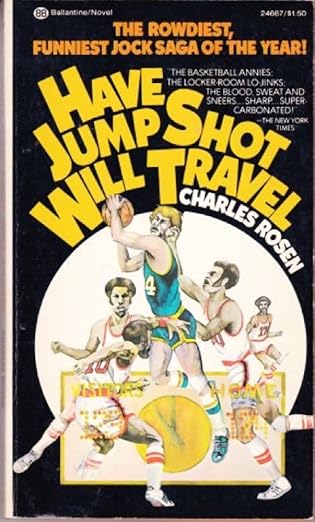
Rosen, who is 6-8 and 235 pounds, was the first 1,000-point scorer in the history of Hunter (now Lehman) College. In 1962, Rosen played in the Eastern League, forerunner of the CBA.
In “Have Jump Shot Will Travel,” Bo says, “There’s too much useless information fermenting inside my head for me to concentrate on anything, let alone basketball .. . The only shot I ever blocked during my career at Hunter was one of my own. I think I was waving to some chick with one hand while I was shooting with the other.”
The book did well critically, Rosen said, “but I always thought it was a little pretentious. I tried to load it up with all kinds of Dantesque symbolism. I tried to make it a little more weighty than perhaps it was capable of being. It was kind of poetic and maybe too radical writing for those days.”
In 1977, Rosen wrote “A Mile Above The Roof, ” a novel about the NBA, and he followed that in 1981 with another novel, “God, Man and Basketball Jones.” That was an intent to talk about the spirituality that underlies basketball,” Rosen said. Rosen’s most recent book was “Players and Pretenders,” covering a year Rosen spent coaching basketball at Bard College.
How does a Renaissance warrior such as Rosen view himself in a jock society?
“It’s the same Zen kind of thing,” he said. “When it’s time to think, you think; when it’s time to sit in a locker room and tell Pace Mannion to fuck off, then it’s time to do that. I think if you’re honest with yourself and you don’t have a rigid concept of who you are, then you can be real and experience as much as possible – as many extremes as possible, which really enriches your life.
“It’s more fun.”




Leave a Response